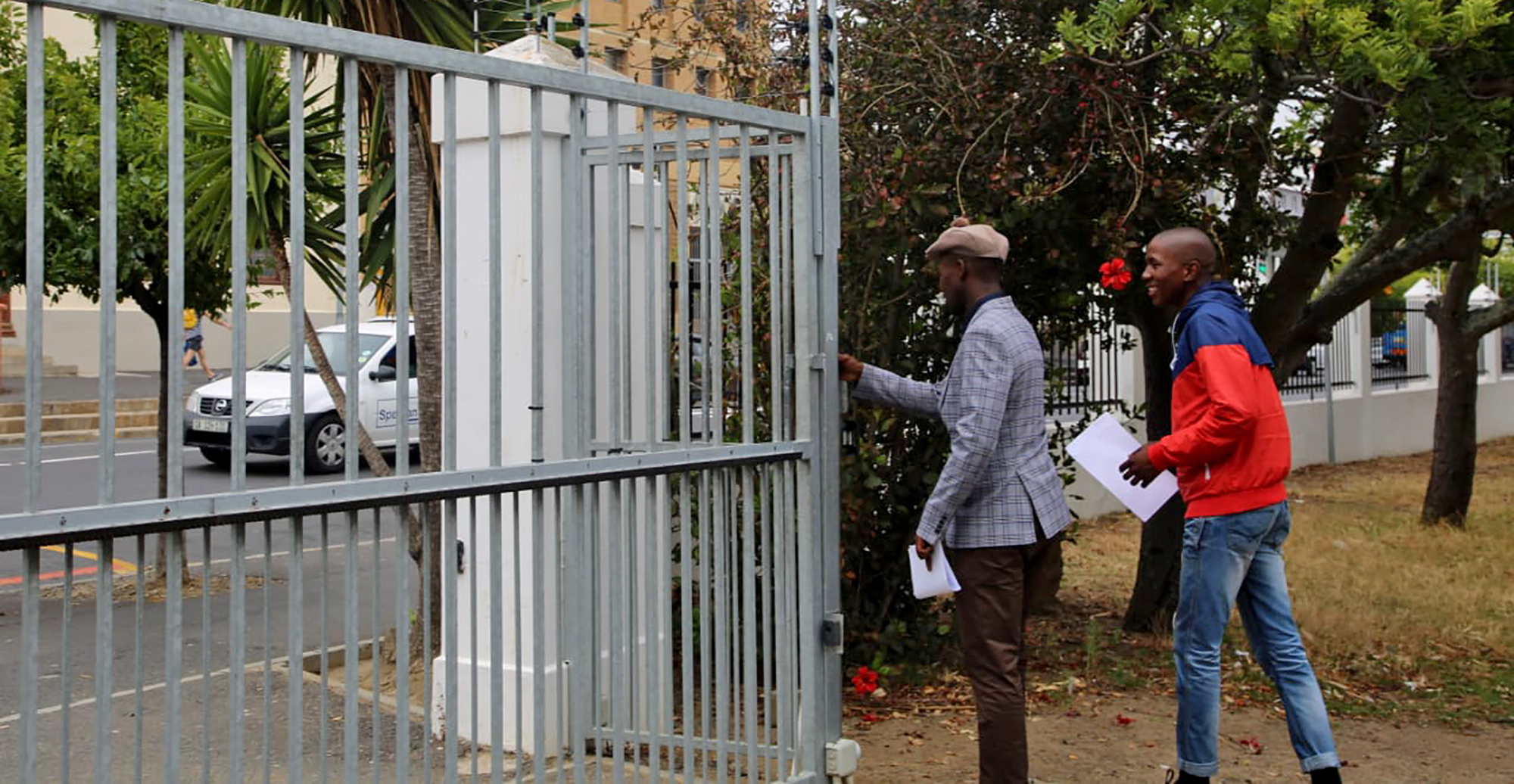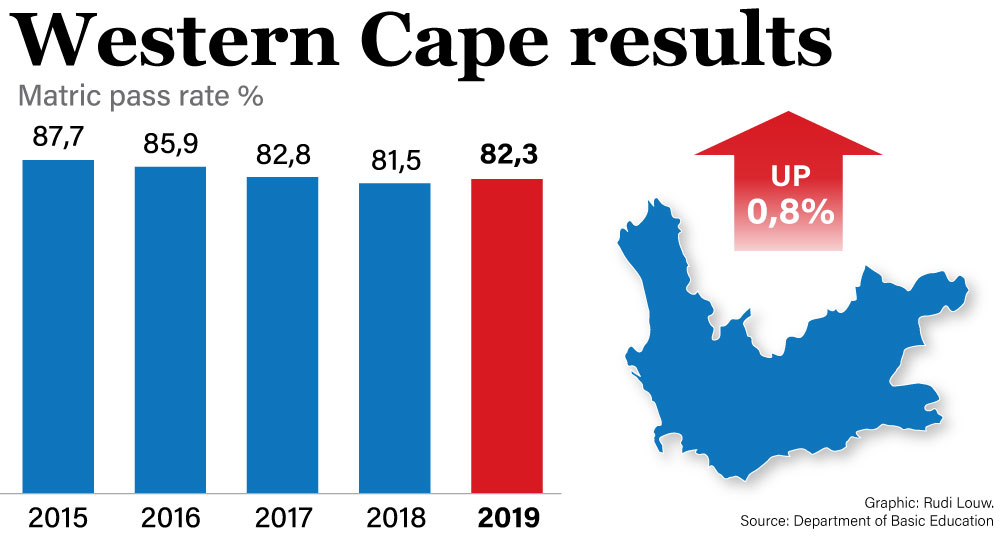EXAM SUCCESS
Sea Point High: Long, hard road to matric achievement

Travelling long distances between township areas and schools is never easy — learners are exposed to crime and other dangers while commuting. But despite these challenges, matriculants from Sea Point High in Cape Town have managed an 82% pass rate in the National Senior Certificate examinations.
Sibulele Samuel, Phelisa Mhlungulwana, Mihlali Mpako and Wonga Godolo are all 18-year-old learners at Sea Point High School, a former Model C school in Sea Point on the Atlantic Seaboard, one of Cape Town’s more affluent suburbs. These students, who all matriculated on Wednesday, have one thing in common: they all spend up to four hours a day travelling every school day, using either private or public transport. This comprises two hours in the morning and another two hours travelling from Sea Point to their homes in the townships of the Cape Flats.
The boys — Samuel and Godolo — who live in Khayelitsha, tell Daily Maverick they get up at 4am just to make it to school by 8am, using two buses — one from Khayelitsha to the Cape Town CBD and from there to their school. Samuel said he couldn’t use the trains because “trains are too dangerous and slow and have a lot of delays”. In the afternoon, it’s the same thing: for two hours they are stuck in public transport. By the time they get home they are exhausted, but then there still is homework and studying to do.
Mhlungulwana, who lives in Mandalay, near Khayelitsha, said travelling to school in the morning is not that difficult as “in the mornings, its usually okay because you get to sleep in the bus”, but she only gets home at 7 pm due to extra classes and extramurals.
Principal Leana le Breton tells Daily Maverick that because most students are not from Sea Point nor even the inner city, and are from areas such Khayelitsha, Manenberg and Mitchell’s Plain — as le Breton describes it, “from Hout Bay to Kuils River”, they arrive late for school and this has a negative effect on their learning experience.
Learners arrive late and often exhausted from travelling and cannot concentrate in class, said Le Breton, who added:
“What I do see is a lot of our learners are tired — on occasion the learners are sleepy”. When Daily Maverick visited the school on Wednesday, Le Breton, schoolteachers, the school counsellor Sharnette Gordon and the rest of the staff were preparing to hand reports to the 60 learners who were in matric in 2019. Le Breton told Daily Maverick that the pass rate for the year was 82%.
But even missing the first five minutes or even the first class of the day “really impacts us a bit”.
Le Breton says parents can spend anywhere between R900 and R1,200 a month on transport to school. The school’s bursar office might spend about R5,000 a month helping those in need to get to school. When learners are late, it is up to the school’s counsellor Sharnette Gordon to intervene.
Gordon told Daily Maverick that learners travel long distances and this is expensive and tiring. If learners don’t relax, it has negative consequences; poor coping skills, increased stress levels, little time to connect to their families and a direct effect on their safety. But the most important effect of travelling long distances is children becoming tired and hungry. Gordon says as learners often skip breakfast to get to school on time, they rush to get unhealthy foods and energy drinks which hampers concentration even further.
Gordon told Daily Maverick this is a “perpetual state of tired. Tired begets tired” as travelling to school — often a small part of the school experience, now becomes a large part of it. One of these learners is Khanyisa Chakuma, who will be studying law soon. Chakuma, an 18-year-old from Gugulethu, had to take the bus from Nyanga to Cape Town, then another bus to the school, and would often arrive late for classes.
“I’m used to it,” said Chakuma, who would arrive home after 6pm, then go to a gym then set an alarm to get up and study. In the morning, the same thing again: getting up early only to arrive late and not be able to concentrate — “sometimes its usually because you’re hungry and tired at the same time.”

Caption: Matriculant Khanyisa Chakuma says he will study law now that he has passed his examinations. He attended Sea Point High School in Cape Town. Photo: Suné Payne, 8 January 2020.
What if there was a way to ease the travelling burden for both learners and parents? Where learners could stay near their schools in a safer environment and they would not arrive at school late?
In 2017, the Western Cape government sold Tafelberg — a provincially owned property in Sea Point. At the time, the provincial government ignored its own feasibility studies which found that social housing could be built on the 1.4ha premises. Non-government organisations Reclaim The City and Ndifuna Ukwazi then approached the court to reverse the sale and force the provincial government to use the property for social housing instead. Education activists Equal Education’s submission as a friend of the court argued that housing policy should take education into concerns, especially if there was an effort to reverse spatial apartheid.
Read in Daily Maverick: Behind the Tafelberg row: Cape Town township kids’ grind to reach school
Equal Education argued in its court papers that if affordable, or social, housing were to be built in inner-city areas such as the Cape Town CBD, parents would be able to afford to live in these areas, including Sea Point, thus drastically cutting down on the travel time and expenses for their children who attend school in more affluent areas. This would also prevent children from living in fear of becoming victims of crime while they commute between home and school. Equal Education’s research was conducted on three schools in the inner CBD area, including Sea Point High School, which is why Daily Maverick visited the school on Wednesday.

Caption: Two matriculants leave Sea Point High School in Cape Town after receiving their National Senior Certificate results on Wednesday afternoon. Photo: Suné Payne, 8 January 2020.
The decline of matric results in the Western Cape
Sea Point High School had a pass rate of 82%, close to the Western Cape pass rate, which stood at 82.3%. But the province’s matric results have gone through a slump over the past five years. In 2015, the pass rate was 87.7% — the highest provincial rate in the country. In 2019 the province slipped fourth in the country.

Political parties have called out the DA-governed provincial government on these results. ANC Shadow MEC for Education Muhammad Khalid Sayed said on Wednesday the provincial results had “worried” the ANC, the official opposition in the legislature.
“The Western Cape has again disappointed by being announced the fourth province with only 82.3% pass rate in South Africa during the matric 2019 exams. This means almost 20% — or one in five learners — failed in this “best at everything” province,” said Sayed.
Another opposition party, GOOD, also criticised the province’s results. While GOOD’s Brett Herron congratulated those who had passed, he said:
“The so-called ‘Western Cape Safety Plan’ also identifies education as a key component of addressing the root causes of crime… If the Western Cape government is sincere about the role of education in its ‘Safety Plan’ then it cannot afford to cut funding for education as it did in the December 2019 adjustments budget — the education department cut R34-million from the ‘Public Ordinary School Education’ and R7-million from the ‘Early Childhood Development’. Cutting the funding of educators is not what a government committed to improved socio-economic outcomes would be doing.”
Meanwhile, after the release of the national results provincial MEC for Education Debbie Schäfer said “in general, I am very pleased with the performance of the Western Cape, especially given the difficulties that we are facing as a result of inadequate funding and safety concerns. I would like to congratulate all our learners, teachers and administrative staff, who have put in an immense effort”. DM
















